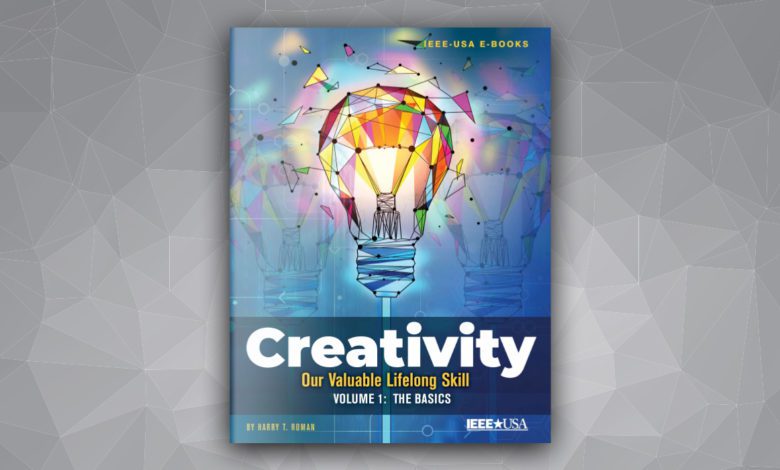

Creativity – Our Valuable Lifelong Skill – Vol. 1: The Basics
FREE to IEEE Members
Non-Members: $2.99
Prolific writer and educator about all things engineering (and beyond!), Harry T. Roman is out with another e-book series. This first book, Creativity: Our Valuable Lifelong Skill, Volume 1: The Basics, is the first of a three-book series on creativity.
Roman developed an appreciation for creativity early in his career. Reflecting on his long career, he writes, “For me, creativity and imagination, and my career in engineering, became absolutely linked.” The author credits creativity for much of his success in engineering, in R&D, and as an educator.
Roman believes that parents can encourage creativity by allowing children to play a role in solving problems at home. He suggests letting them be part of redecorating rooms, planning home renovations, and choosing and organizing summer vacations — letting children know their parents value their input, and that it is okay to “think outside the box.”
We all have met the child who always asks, “Why?” And while this can be tiring after a long day of work, or frustrating when trying to get the house in order, Roman believes the starting point for fostering curiosity is to encourage just such questioning: “Asking questions is the raw fuel for creative thought and actions.”
Roman notes that in the business world, many of the new corporate leaders, such as Google, are looking beyond grades and academic achievement. These employers and are increasingly interested in a recent graduate’s ability to “solve problems, work in teams, and be a leader,” all requiring creativity. He adds that employers of the future will look for someone who doesn’t just accumulate knowledge but “who can put their knowledge to work.”
Roman outlines the four “Cs” necessary to prepare the next generation to be creative, and to generate the ideas necessary for the unprecedented global changes to come:
- Creativity
- Curiosity
- Collaboration
- Communication
Educators, he argues, need to work to support, and not inhibit, creativity — making sure they make room for failure, encourage brainstorming, and celebrate out-of-the box thinking.
He goes further, suggesting that schools need to begin to treat creativity with the same importance that they treat the teaching of reading, writing and arithmetic. The author is not suggesting adding new courses in creativity; he means that educators need to integrate creativity into lesson plans across the curriculum — in a way that “values and celebrates its daily application.”
As with many of his IEEE-USA e-books and audiobooks, Roman provides an array of activities that a teacher (or parent) might use to stimulate creativity. Just a few of these include having a student (or team of students):
- Design a weather station for the school
- Host an invention contest
- Design a solar installation or greenhouse for the school, including a determination of optimum location as well as a cost analysis
- Redesign the classroom
Roman encourages teachers (or parents) to urge young people to keep a notebook of thoughts and ideas — “a chronologically-kept compendium identifying why and how their creative activities are focused; and reviewing progress and set-backs, new directions being taken, and the results of activities.” He believes that the earlier students develop “a discipline of keeping detailed notebooks, the more proficient they will become in directing their creativity toward solving key problems.”
Creativity: Our Valuable Lifelong Skill, Volume 1: The Basics is available to IEEE members for free at IEEE-USA’s online shop and is available for non-members for $2.99.
Future books in the series will cover Spurring Creativity in the Classroom, and Creativity Challenges — to sharpen students’ understanding and application of creativity.
Harry T. Roman holds 12 U.S. patents, has received numerous engineering, invention and teaching awards, and has published more than 550 scientific papers, articles, monographs, and books. He was named a Distinguished Technology Educator by New Jersey Technology Education and Engineering Association. IEEE has honored Roman with a Meritorious Achievement Award, for developing continuing education products for IEEE members – as well as with an Outstanding Engineer award. Throughout his engineering career, Roman has worked with schools, bringing the excitement of real-world problem-solving into the classroom. The author continues to sharpen his creativity through writing and publishing poetry and short stories.






